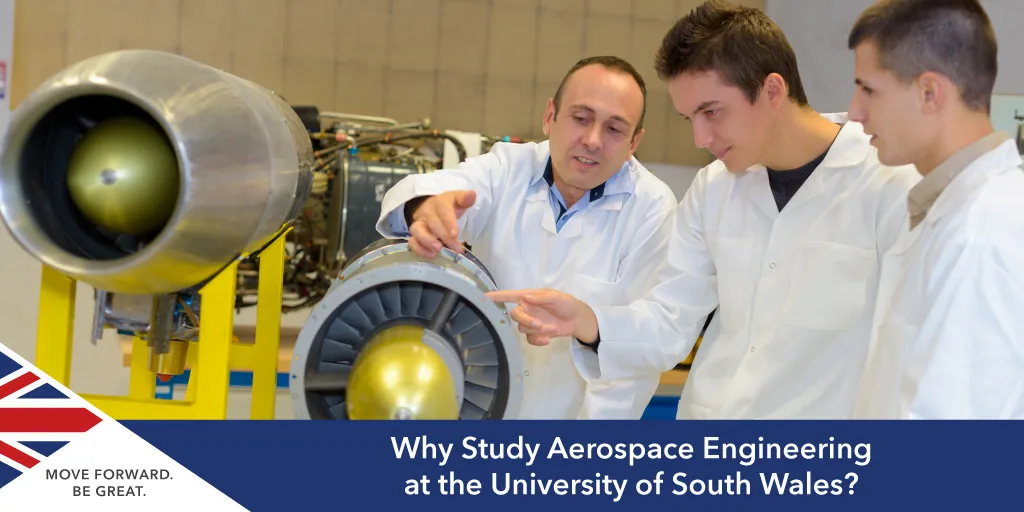Aeronautical engineering is a field that focuses on the development, creation, testing, and upkeep of machines capable of flight. This includes various aircraft such as airplanes, helicopters, drones, and missiles. It's one of two branches of aerospace engineering, with the other being astronautical engineering. The distinction lies in their scope: aeronautical engineers work on systems that operate within Earth's atmosphere, while astronautical engineers deal with objects that function beyond the atmosphere, like satellites, rockets, and shuttles.
The MSc Aeronautical Engineering at the University of South Wales is a leading aeronautical engineering degree and is ideal for graduates seeking employment in the aeronautical sector and for practicing aerospace engineers who want to extend and update their skills.

9 Reasons to Study Aeronautical Engineering at USW
1. In-depth focus
MSc Aeronautical Engineering at the University of South Wales is an excellent choice if you're interested in the aerospace industry or want to enhance your skills as an aerospace engineer. This master's programme teaches you the technical aspects and helps you develop essential management skills for leadership roles in your career. Moreover, it's accredited by respected organisations like the Institution of Mechanical Engineering and the Royal Aeronautical Society, meaning it meets the academic requirements for becoming a Chartered Engineer.
Aeronautical engineering involves designing, building, testing, and maintaining flying machines within Earth's atmosphere, like planes, helicopters, drones, and missiles. It's different from astronautical engineering, which focuses on things like satellites and rockets outside our atmosphere. The programme offers courses covering advanced materials, aircraft design, and propulsion, providing you with comprehensive knowledge and skills in aeronautical engineering.
2. Accessible entry requirements
To apply for the MSc Aeronautical Engineering at the University of South Wales, you typically need the following:
- Academic Qualifications: A minimum of a 2:2 Honours degree in aeronautical or aerospace engineering is the preferred qualification. However, applicants with relevant engineering degrees will also be considered.
- English Language Proficiency: International applicants are welcome, but you must demonstrate proficiency in English. The university typically requires an IELTS score of 6.0 overall, with a minimum of 5.5 in each component. Equivalent English language qualifications are also accepted.
3. Diverse course structure and modules
The MSc Aeronautical Engineering is a comprehensive degree where you'll study various modules and complete a substantial dissertation.
- Advanced Materials and Manufacture: Understand modern engineering materials and manufacturing processes for aeronautical applications.
- Fatigue and Fracture: Learn how to analyse and prevent failures due to fatigue in engineering designs.
- Further Finite Element Analysis: Assess the use of finite element analysis in engineering, including modelling and result analysis.
- Further Computational Fluid Dynamics: Gain practical knowledge of numerical methods used in computational fluid dynamics analysis.
- Research Methods for Engineers: Learn how to effectively collect, analyse, and interpret engineering research information.
- Aeroelasticity: Understand the interaction of forces on aircraft and how it impacts aircraft design.
- Professional Engineering Management: Develop leadership and management skills in engineering businesses.
- Advanced Propulsion: Analyse and understand aircraft engine components and design.
- Advanced Aircraft Design: Conceptually create, simulate, and optimise aircraft designs.
- Dissertation: The final project where you'll apply what you've learned to conduct in-depth research on an engineering topic.
These modules provide a well-rounded education in aeronautical engineering and prepare you for a successful career. Your dissertation represents the culmination of your learning, allowing you to apply your knowledge to a real-world engineering project.
4. Great facilities
The University of South Wales offers excellent facilities for students in the MSc Aeronautical Engineering, including:
- Computer Rooms: Equipped with industry-standard design and analysis software like SolidWorks, Ansys, FEA, CFD, and LS-Dyna. There's also access to a high-speed computational cluster (supercomputer) for complex calculations.
- Dedicated Project Room: A space where students can work on their projects and collaborate with peers.
- Wind Tunnel: Used for testing and analysing aerodynamic designs.
- Laser Cutter: Utilised for designing and manufacturing wing profiles, especially before testing in the wind tunnel.
- Composite Making Facilities: For creating wing profiles using composite materials.
- Additive Manufacturing Facilities: Including 3D printing capabilities.
- Material Testing Facilities: Important for evaluating the properties of materials used in aeronautical engineering.
- Non-Destructive Lab: For conducting tests and inspections without damaging the materials or structures.
- Engineering Workshops: Equipped with CNC machining, lathes, milling machines, drills, and other tools for hands-on work on final-year projects.
These facilities provide students with the necessary resources and hands-on experience to excel in their coursework and research projects, making the MSc Aeronautical Engineering programme at the University of South Wales comprehensive and practical.
5. Reasonable tuition fees
Tuition fees for the MSc Aeronautical Engineering at the University of South Wales:
- Full-time international students can expect to pay £16,000 per year in tuition fees
- Part-time fees are based on a per-20-credit rate
- Tuition fees will remain consistent throughout the entire duration of your study on the course
University of South Wales students receive free study resources such as textbooks, online journals, and laptops. While generally sufficient for coursework, additional expenses like travel, memberships, stationery, printing, and equipment may be necessary, either mandatory or optional, based on individual needs and interests.
6. Course rankings
The University of South Wales, ranked 17th in the UK by the Guardian University Guide 2024, is renowned for its aeronautical engineering programme. Its strong academic reputation and industry connections offer an excellent opportunity to pursue a master's degree in this field.
7. Scholarships options
The University of South Wales offers a variety of scholarships for international students, making it easier for them to pursue their education at the university. These scholarships are automatically considered when you submit your application, and if you are eligible, you'll receive confirmation of the scholarship along with your offer letter.
- International Office Scholarships
- Automatically considered during the application process.
- Up to £2,000 available.
- Applicable to both undergraduate and postgraduate students.
- EU Scholarships
- Available for EU students in the academic year 2023-24.
- Ensure tuition fees do not exceed fees for Home students.
- Progression Fee Discount for USW Graduates
- £6,000 discount for self-funding USW international graduates.
- Automatically considered if you meet the eligibility criteria.
- Must progress to a Master's within two intakes after graduation.
8. Led by experts
The MSc Aeronautical Engineering at the University of South Wales is led by Dr Ruben Ramasamy, supported by a team of experienced lecturers, including:
- Ilias Lappas
- Dr. Rae Gordon
- Dr. Mohamed Mohamed
- Dr. Meinwen Taylor
- Matthew Jones
- Ewen Constant
- Dr. Xiao Guo
- Dr. Shee-Meng Thai
- Dr. Joao Ramos
These faculty members bring diverse expertise, ensuring students receive comprehensive and up-to-date knowledge in aeronautical engineering.
9. Exciting career prospects
A master's degree in aeronautical engineering opens up exciting career paths in various fields. With this degree, you can explore opportunities in commercial and military aircraft engineering, the air transportation industry, teaching, or research. The skills you gain are also valuable in technology-focused industries. As you advance, you'll likely secure senior positions in aeronautical engineering and related sectors.
The aeronautical industry is dynamic and diverse, offering strong employment prospects. Whether you want to design aeroplanes, work in aviation logistics, teach future engineers, or contribute to groundbreaking research, this degree equips you with the knowledge and skills to excel in aeronautical engineering.
10. Excellent salary expectations
On average, a beginner in the field of aeronautical engineering can expect an annual salary of around £25,000 to £30,000. An aeronautical engineering salary can increase significantly as one gains more experience and expertise. Experienced aeronautical engineers with several years of work may earn between £40,000 to £60,000 or more per year.
MSc Aeronautical Engineering at USW FAQ
What is the acceptance rate for MSc Advanced Aeronautical Engineering?
The acceptance rate for the MSc Advanced Aeronautical Engineering course at the University of South Wales is 35-40%.
What are famous alumni from the University of South Wales?
The University of South Wales boasts accomplished faculty members like Dr Ruben Ramasamy, Ilias Lappas, Dr Rae Gordon, Dr Mohamed Mohamed, Dr Meinwen Taylor, and others, which contribute to the excellence of its aeronautical engineering programme.
What is the course duration of the MSc in Aeronautical Engineering in the UK?
Typically, it's a one-year full-time programme. However, some universities may offer part-time options, which may take longer to complete.
What is the best postgraduate degree at the University of South Wales?
The University of South Wales offers a variety of postgraduate courses in different fields, including engineering, business, arts, and sciences. To determine the best postgraduate degree for you, consider your academic background, career aspirations, and personal interests.



 I sincerely thank SI-UK for getting me accepted to UCL. The MSc in Urban Development and Planning is extremely competitive, but the right guidance provided by SI-UK made my dream of studying at University College London a reality. The services were exceptional from beginning to end.
I sincerely thank SI-UK for getting me accepted to UCL. The MSc in Urban Development and Planning is extremely competitive, but the right guidance provided by SI-UK made my dream of studying at University College London a reality. The services were exceptional from beginning to end. 

